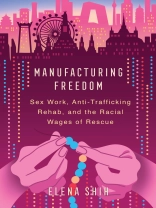Sex worker rescue programs have become a core focus of the global movement to combat human trafficking. While these rehabilitation programs promise freedom from enslavement and redemptive wages for former sex workers, such organizations actually propagate a moral economy of low‑wage women’s work that obfuscates relations of race, gender, national power, and inequality.
Manufacturing Freedom is an ethnographic exploration of two American organizations that offer vocational training in jewelry production to women migrants in China and Thailand as a path out of sex work. In this innovative study, Elena Shih argues that anti‑trafficking rescue and rehabilitation projects profit off persistent labor abuse of women workers and imagined but savvily marketed narratives of redemption.
Tabla de materias
Contents
Preface
Introduction: The Slave-Free Good
1. The Business of Rehab: Ethical Consumption, Social Enterprise, and the Myth of
Vocational Training
2. Manufacturing Freedom: Racialized Redemptive Labor and Sex Work
3. Bad Rehab: House Moms, Shelters, and Maternalist Rehabilitation
4. Trafficking Benevolent Authoritarianism in China
5. Vigilante Humanitarianism in Thailand
6. Quitting Rehab: The Promises and Betrayals of Freedom
Conclusion: Redistribution and Possibilities for Global Justice
Acknowledgments
Methodological Appendix: The Embodied Currencies and Debts of Global Feminist Fieldwork
Notes
References
Index
Sobre el autor
Elena Shih is Manning Assistant Professor of American Studies and Ethnic Studies at Brown University, where she directs a human trafficking research cluster through the Center for the Study of Slavery and Justice.












